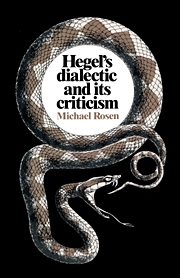Book contents
- Frontmatter
- Contents
- Preface
- A note on texts and translations
- Abbreviations of works referred to
- 1 The Interpretation of Philosophy
- 2 Determinate Negation and Immanent Critique
- 3 The Dialectical Movement
- 4 Imageless Truth
- 5 The Prose of Thought
- 6 From Being to Nothingness (and Back Again)
- 7 A Negative Dialectic?
- 8 Conclusion
- Bibliography
- Index
2 - Determinate Negation and Immanent Critique
Published online by Cambridge University Press: 26 January 2010
- Frontmatter
- Contents
- Preface
- A note on texts and translations
- Abbreviations of works referred to
- 1 The Interpretation of Philosophy
- 2 Determinate Negation and Immanent Critique
- 3 The Dialectical Movement
- 4 Imageless Truth
- 5 The Prose of Thought
- 6 From Being to Nothingness (and Back Again)
- 7 A Negative Dialectic?
- 8 Conclusion
- Bibliography
- Index
Summary
It is the ways in to philosophy that are the most interesting part of the subject; for it is the course taken at the outset – in the first steps taken from ordinary ways of speaking to the extraordinary things which philosophers habitually say – that determines the whole of a thinker's theories.
R. M. HareThe question which is to initiate the interpretation of Hegel is: can Hegel's speculative dialectic be criticized rationally? The question is of evident concern to the interpreter. But why should its openness to criticism be a special problem for the discussion of Hegel's system? What seems a forceful consideration presents itself: ‘The true’, Hegel writes,
is the whole. But the whole is only the essence which completes itself through its development. It is to be said of the Absolute that it is essentially result, that only at the end is it that which it is in truth.
(P. d. G., p. 21)And further:
The true form in which the truth exists can only be as its Scientific system.
(P. d. G., p. 12)If the truth requires a system, then it only properly exists at the point of completion of the system; what precedes it is only partial, but not adequate. As critics, however, what should interest us is how that point of completion is obtained, and whether we have arrived at it legitimately or not.
- Type
- Chapter
- Information
- Hegel's Dialectic and its Criticism , pp. 23 - 54Publisher: Cambridge University PressPrint publication year: 1982
- 1
- Cited by

